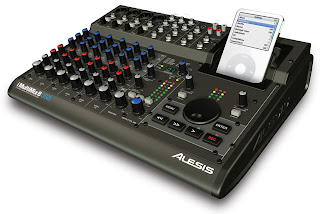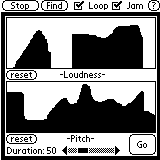There have been a few notes out from Tim Cole about the site consolidation at Tao. It seems that miniMixa is evolving into a platform which will comprise a variety of new applications:
miniMIXA Application Suite
The intent miniMIXA suite of modular, commercial quality applications, provide powerful and easy-to-use music and media mixing software applications (including the BAFTA award winning mobile music mixer) for smartphones, Pocket PC / PDA and XP desktop, comprising:
miniMIXA RingtoneDJ
miniMIXA MusicDJ
miniMIXA MoBlogger
Here's a little bit more about each.
miniMIXA™ RingtoneDJ
miniMIXA™ RingtoneDJ provides an easy to use, personalised ringtone mixer.
- Easy to use interface lets users mix, save and perform their own great sounding audio or MIDI ringtone
- Range of over 20 different global, high quality live sound FX including reverb, chorus, filter, compressor, EQ, delay
- Up to 12 independent audio channels: each with volume control, track FX, loop on/off
- Key presses or Navkey are used to create and control mixes simply, quickly and easily
- User configurable key press and navkey operation for maximum flexibility, e.g. loop on/off, select content, track fx
- Content formats include audio, MIDI and modular synthesizer, depending on configuration
- Auto pitch-shift & time-stretch allow mixing and matching of content "on the fly" from different MIXApaks
- High quality user selectable output in mono or stereo, and up to CD quality (device dependent)
- Audio & MIDI recordings can be emailed, depending on configuration & content
- Recordings include audio, MIDI, key strokes and microphone (users can make and mix in their own per-track mic recordings)
miniMIXA™ MusicDJ (this one is most like the current miniMixa as far as I can tell)
miniMIXA™ MusicDJ turns a mobile phone into a portable recording studio, enabling the delivery of advanced personalised interactive music services and live 'DJ' performances.
- Powerful, yet easy to use UI lets prosumers and DJs create, mix, sequence & perform 12 track music on a mobile
- 4 cells can be sequenced, locked and triggered for each of the audio channels
- Each track features a volume control, track FX and track rules including spot cell, randomise and shuffle
- Columns of cells can be looped / soloed, and allow up to 48 samples to be loaded simultaneously (memory dependent)
- Range of over 20 different global, high quality live sound FX including reverb, chorus, filter, compressor, EQ, delay
- Content formats include audio, MIDI and modular synthesizer, depending on configuration
- Manual and auto pitch-shift & time-stretch allow mixing and matching of content "on the fly" from different MIXApaks
- High quality user selectable output in mono or stereo, and up to CD quality (device dependent)
- Real time Sound FX and Synth sound editor tool
- Recordings include Audio, MIDI and microphone (users can make and mix in their own mic recordings)
miniMIXA™ MoBlogger
miniMIXA™ MoBlogger turns a mobile phone into a powerful, easy to use mobile blogger enabling users to create stunning, high quality video blogs on their phone from a range of multimedia elements. Order selected images and video clips and choose transitions, perhaps record some accompanying personal voice commentary, maybe add in a backing music track to create a mood and even apply some "spot" sound FX for fun. Then export the resulting multimedia production to a video clip.
- Lets a user easily create and preview stunning, high quality video blogs on their phone
- User can select and time order images and video clips, record multiple independent voice commentaries, add backing music and apply multiple "spot" sound FX, depending on product configuration
- Includes over 20 user selectable image transitions including fades, wipes, checkerboard, cross fades
- "Ducking" compressor makes for "pro" voice overs, through attenuating backing track level according to mic recording level
- User adjustable volume levels, global transitions etc. and range of user configurable options
- Resulting multimedia production is exported to a video clip, format depending on miniMIXA configuration
- Supports add on theme packs (MIXApaks) including sound FX, animations, backing tracks, images, video clips and picture frames
- Exported video clip can be uploaded to UGC site, depending on product configuration/integration
- FX and backing track audio formats can include audio, MIDI and synth; user backing music tracks could be made with MusicDJ or RingtoneDJ
Although I could find no way to access any of these applications as yet, they sound very impressive indeeed. If you try going to the store on the site it doesn't seem to be there, so there is no current way to even buy the previous version of miniMIXA, I am hoping that these new apps will be available to download and buy rather than just be available to hardware vendors. It would be a shame if they weren't made available to purchase.
I'll see what else I can find out...













































